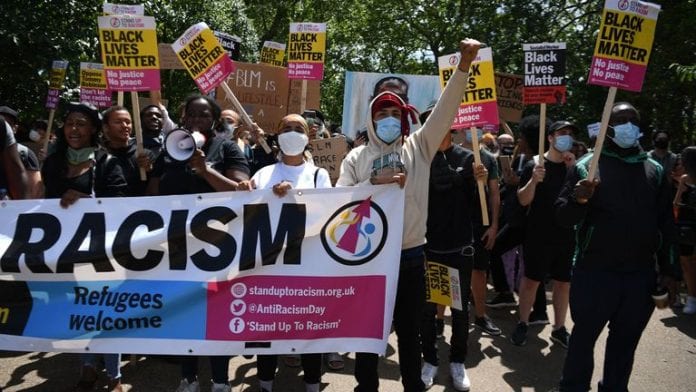The recent protests across the UK against racism have generated a great deal of media attention and debate. Protesting in the UK is a deeply rooted tradition especially when it comes to protesting against government policy. From the suffragettes in the early 20th century fighting for the right for women to vote, the ‘Jarrow Crusade’ against unemployment and poverty in the 1930s and Extinction Rebellion’s protest on climate change, protests have served as an essential mean to draw attention to issues and raise public awareness.
Nevertheless, even peaceful protests are often viewed by many as a public nuisance and, at worst, a situation from which hostility and violence could easily break out and lead to the destruction of property and damage to public structures.
With so many laws and regulations to consider – not to mention Covid-19 social distancing – Jeanine Borg, Legal Adviser at DAS Law, explains your rights…
What are our basic rights to protest?
Freedom of speech and the right to protest peacefully are protected by both the common law and the Human Rights Act 1998.
Furthermore, the ECHR (European Convention on Human Rights) as implied in Article 10 (the Right to Freedom of Expression) protects a right that’s fundamental to our democracy – freedom of expression – which means that we’re free to hold opinions and ideas and to share them with others without the state interfering. Article 11 (the Right to Peaceful Assembly) of the Human Rights Act 1998, meanwhile, allows for peaceful protest to take place without disturbance from authorities – unless of course any act of hostility or violence were to take place.
Knowing the restrictions and the law placed upon peaceful protest can ensure that the message of your protest is heard and is made clear.
What are the rules around organising a protest?
When you are planning a protest, you do not necessarily need to inform the authorities (see point regarding marches above). Doing so, however, could prevent unnecessary trouble or difficulties arising on the day.
The police can impose conditions such as the maximum number of people and the duration of the protest. But the police can only do this if they believe these conditions are required to prevent public disorder or damage to property.
Police are more likely to be co-operative if they have good warning in advance of what to expect, and if they have a clear point of contact amongst the organisers of the protest. It is also more likely to reassure them that those organising the protest have made adequate considerations to make sure everything goes smoothly.
It may also turn out that you need a permit to protest in the area in which you wish to protest. For example, notification to the police will also always be required if the demonstration takes place around Parliament. Failing to gain this permit beforehand could lead to your protest being shut down, so it is worth contacting the police to find out whether you will need one.
Note, however, that any communication you make with the police could be used against you in court if the police decide to charge you for organising an illegal demonstration.
Can the police stop my protest?
The police do have powers under the law to impose restrictions on planned protests. However, these restrictions are unique to each case, and your rights give you the option to appeal against any restrictions that the police attempt to make on your protest.
If you believe unfair restrictions have been placed on your protest, or the protest has been banned from occurring altogether, you may be able to make a case on one of three grounds:
- The decision-making process behind the restrictions was unsatisfactory. For example, if false or assumed information was factored into the decision;
- The restrictions would contravene the right to protest given to all under the ECHR. For example, if police decided that the message behind the protest was too unsavoury to be allowed, violating Article 10;
- The decision is otherwise completely unreasonable or irrational. For example, a schoolboy organising a protest against the closure of his local library, and having it banned by police for fear of a violent outbreak of public disorder.
Police can only place restrictions on a protest or demonstration if they have reason to believe that it will result in property damage, disruption of the community, or serious public disorder. Judicial challenges against these restrictions can only be made at the High Court. The restrictions may be imposed too late for a judicial challenge to be possible, and if you choose to go ahead with the protest in spite of these restrictions, you or your fellow protesters could find yourself placed under arrest.
However, if charges are brought against any protesters and it is found that the restrictions supporting those charges were unreasonable, charges would be dropped and the arrested protesters could be awarded compensation. Going ahead with your protest on this hope is very risky, and it is worth considering the rescheduling of your protest, or at least seeking legal advice.
Other to points to consider include:
- Peaceful protest can only take place on public highways;
- Security guards have no right to move protesters unless the property is on their grounds;
- Assembling on private grounds without the owner’s permission will be seen as trespassing.
What about stop and search powers?
Contrary to what you might believe, police powers to stop and search are the same at a protest as they are anywhere else. Police can only stop and search an individual if they have reasonable cause, and being present at a protest does not constitute reasonable cause.
The law says that you can only be searched if a police officer has a reasonable belief to suspect that you may be carrying something illegal or something that can be used to commit an offence and you are likely to do so. This forms the grounds of the search.
There are two exceptions to this rule, which are known as blanket search powers:
- If a section 60 search power has been granted (Criminal Justice Act).
- If a section 47A search power has been granted (Terrorism Act).
The police often use a piece of law known as Section 1 of PACE (Police and Criminal Evidence Act 1984). Using this power, you can be searched for the following items, provided that there is reasonable individual suspicion:
- Articles for burglary/theft;
- Stolen goods;
- Offensive weapons;
- Bladed articles; or
- Items that may be used to commit criminal damage.
There are other specific laws that allow an officer to search you. They include the power to search for drugs or explosives, and along with Section 1 PACE, always require reasonable suspicion.
Blanket search powers, meanwhile, give the police the ability to search large groups of people, with no reasonable suspicion. They are used a public events such are protests, carnivals and sports games, and are put in place by a senior police officer. There are two blanket search powers that you might come across:
- Section 60 of the Criminal Justice Act 1994
This power allows a police officer to search anyone in a specific area for offensive weapons. The order lasts for 24 hours but can be extended.
- Section 47A of the Terrorism Act 2000 (Remedial) Order 2011
This power allows a police officer to search anyone where they reasonably suspects that an act of terrorism will take place, and that the power is necessary to prevent it from occurring. This allows the police to search anyone or anything for the purpose of prevention of terrorism, and replaces the controversial section 44 (TA2000) after it was found to be incompatible with Article 8 by the European Convention on Human Rights (ECHR).
For further guidance see https://bit.ly/2JuvXOH
Disclaimer: This information is for general guidance regarding rights and responsibilities and is not formal legal advice as no lawyer-client relationship has been created.
Help keep news FREE for our readers
Supporting your local community newspaper/online news outlet is crucial now more than ever. If you believe in independent journalism, then consider making a valuable contribution by making a one-time or monthly donation. We operate in rural areas where providing unbiased news can be challenging. Read More About Supporting The West Wales Chronicle
























